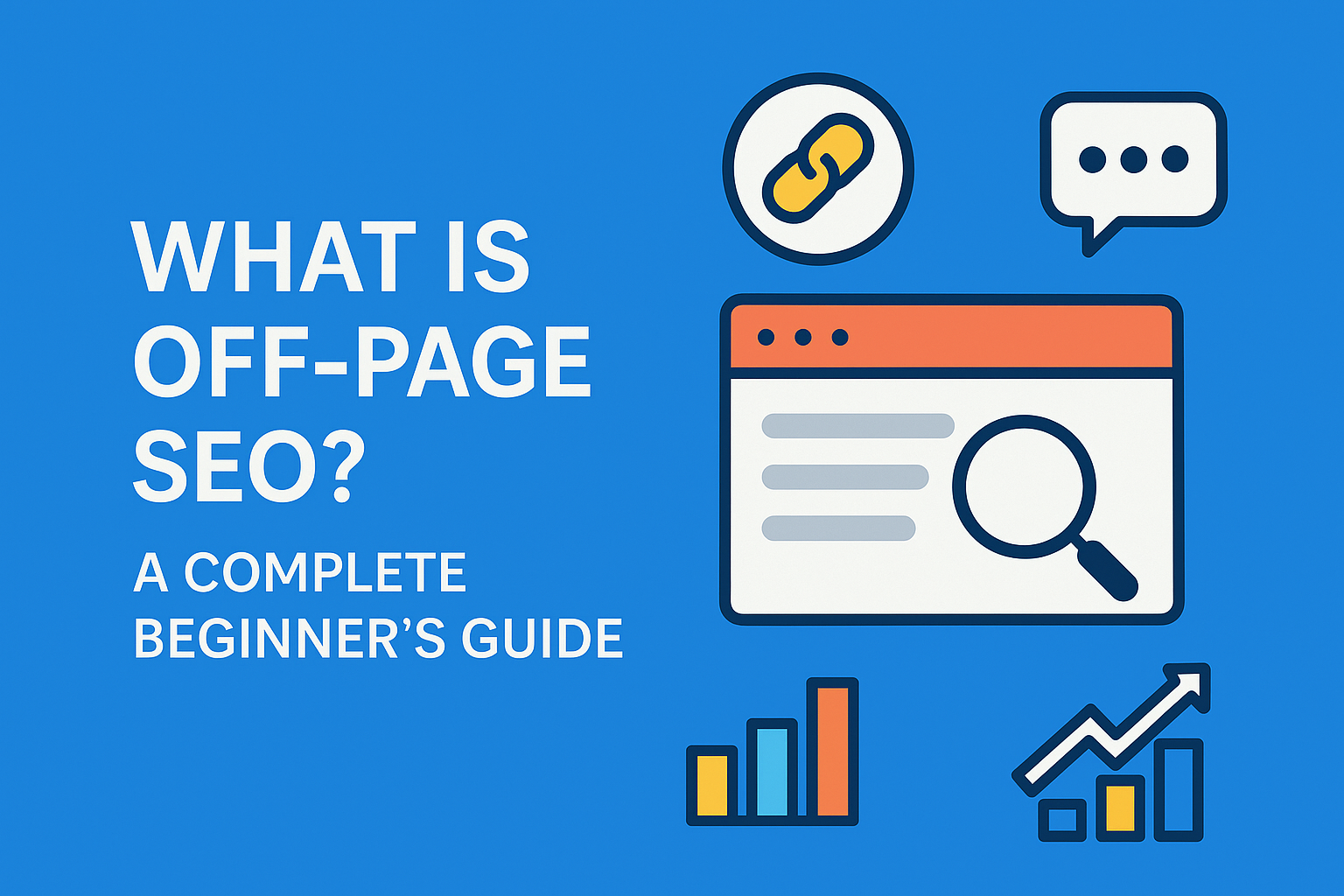- What off‑page SEO means and how it’s different from on‑page SEO
- Why it’s critical for search engine ranking, domain authority, and credibility
- Core off‑page SEO techniques every beginner should know
- How to measure success and avoid common missteps
What Is Off‑Page SEO?
At its core, off‑page SEO refers to all the tactics used outside your website to improve its search engine rankings. Think of it as digital reputation management—every time someone mentions, links to, or shares your content, they’re vouching for your site’s trustworthiness and relevance.
Off‑Page vs. On‑Page SEO
| Factor | On‑Page SEO | Off‑Page SEO |
|---|---|---|
| Location | Your own website | External websites, platforms, social channels |
| Focus | Content, keyword optimization, site speed | Link building, brand mentions, social signals, PR |
| Control Level | Full control | Partial—depends on outreach and relationships |
| Goal | Relevance to search queries | Authority, trust, and reputation across the web |
Why Off‑Page SEO Is Important
Skipping off-page SEO is like having a beautifully designed store with no customers at the door. The effort ends up wasted if nobody outside knows you’re there. Here’s why off-page SEO matters:
- Boosts Search Ranking: External signals like backlinks are treated as votes of confidence by search engines.
- Increases Domain Authority: Quality backlinks from reputable sources increase your site’s trust score.
- Builds Trust and Credibility: Mentions from trusted brands elevate user and algorithmic trust.
- Drives Referral Traffic: Links can bring real, qualified traffic from external sites.
- Supports Brand Awareness: Off-page visibility helps spread the word and grow your audience.
Key Off‑Page SEO Techniques
1. Link Building
- Guest Blogging: Write for industry blogs and include backlinks to your content.
- Broken Link Building: Replace dead links on other websites with yours.
- Resource Page Outreach: Ask to be included in helpful resource roundups.
- Skyscraper Technique: Improve popular content and get others to link to your version.
2. Social Media Engagement
Promote your content across platforms. Engagement here can lead to shares, mentions, and backlinks indirectly.
3. Guest Blogging
Contributes to authority and builds strong contextual backlinks from relevant sources.
4. Influencer Outreach
Collaborate with influencers who can share your content and grow your reputation.
5. Brand Mentions & Public Relations
Earn mentions in media and use tools to convert them into backlinks when possible.
6. Forum and Community Participation
Be active in discussions—offer value and link to your resources only when appropriate.
7. Local SEO & Citations
Optimize business listings and gain backlinks from local directories and communities.
8. Collaborative Content & Podcasting
Co-create and get featured on podcasts, leading to backlinks and referral traffic.
9. Participating in Awards and Roundups
Apply for “best of” lists to earn high-value backlinks and mentions.
10. Scholarship and Sponsorship Outreach
Offer scholarships and get featured on educational (.edu) websites.
How to Measure Off‑Page SEO Success
Key Metrics
- Backlink Volume
- Link Quality (Domain Authority, Relevance)
- Referral Traffic
- Brand Mentions
- Social Shares
Top Tools
- Ahrefs
- Moz
- SEMrush
- Google Search Console
- Google Analytics
Common Off‑Page SEO Mistakes to Avoid
- Buying backlinks
- Using spammy directories
- Keyword stuffing anchor texts
- Guest blogging on irrelevant websites
- Ignoring backlink audits
- Lack of anchor text diversity
Best Practices & Tips for Beginners
- Create valuable, link-worthy content
- Focus on personalized outreach
- Be consistent and track everything
- Use varied backlinks and formats
- Build relationships with industry voices
- Use disavow tools to protect your backlink profile
FAQ
- What is the easiest way to start with off‑page SEO?
- Start with guest blogging and resource page outreach to earn relevant backlinks.
- How many backlinks do I need to rank on Google?
- There’s no set number—it depends on your niche. Focus on quality over quantity.
- Do social media links help SEO?
- They’re not direct ranking signals but boost visibility and can lead to backlinks.
- What’s the difference between a do‑follow and no‑follow backlink?
- Do‑follow passes SEO value; no‑follow doesn’t—but both are useful for traffic and visibility.
- How often should I perform link audits?
- At least quarterly. Disavow harmful links as needed to maintain SEO health.
Conclusion
Off‑page SEO transforms your website from a standalone asset into a trusted, well-connected authority across the web. It amplifies your on-page efforts and builds long-term digital success.
Start slow, focus on relationships, and track your progress. Over time, off-page SEO will elevate your site’s visibility, credibility, and traffic naturally—one high-quality backlink at a time.



https://t.me/s/B27_1WIN/37